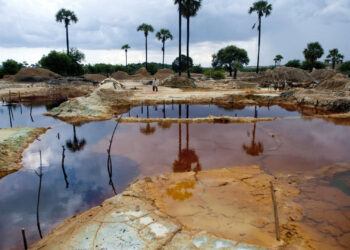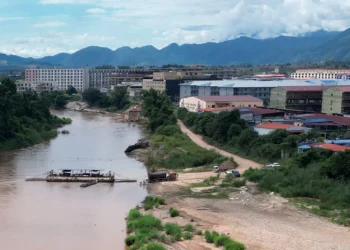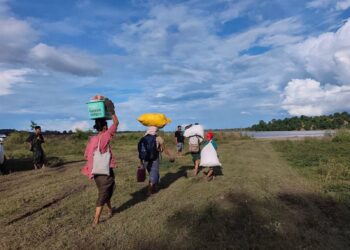One night in December last year, U Aung Win’s* fuel truck broke down outside the town of Monywa in war-torn Sagaing Region. After pulling over to work on the vehicle, he tested his repairs by starting the engine. The truck roared to life, but his headlights flashed on a group of Tatmadaw soldiers patrolling nearby.
Aung Win said he had no idea the soldiers were there, but they accused him of intentionally exposing their position.
“I was severely beaten,” he told Frontier. “I was bed-ridden for two weeks and needed medication.”
Truck driving in Myanmar was never an easy job. Drivers had to endure long hours in solitude, navigating often dangerous and unfinished roads. But since the 2021 military coup, a surge in conflict has led to a proliferation of checkpoints, manned both by the Myanmar military and a wide array of resistance groups. At every checkpoint, something could go wrong.
“These days, wherever you go, there is risk and danger,” said Daw Moe Moe* from Magway Region’s Myaing Township, another area wracked by conflict. “A driver from our village was hired to go to Mandalay, and on his way back, he was stopped by the military and is now in jail.”
The driver typically transported crops and pharmaceuticals in his Hijet minitruck to the larger towns and cities of Myanmar’s central Dry Zone, including Mandalay, Pakokku and Monywa. On this trip in February, he was taking a few people to Mandalay to search for work.
Moe Moe said he was stopped in Magway’s Yesagyo Township on his return trip and is now serving a three-year sentence in Pakokku Prison, also in Magway, on unknown charges.
“Maybe because he’s an NLD supporter. I heard when they checked his phone, they found pictures related to the NLD,” she said, adding that other passengers in the car were released.
The National League for Democracy was re-elected by a landslide in November 2020, before being overthrown by the military in February 2021. The new junta responded to mass peaceful protests with brutal crackdowns, killing hundreds and sparking an armed uprising. Newly formed anti-coup armed groups, broadly known as People’s Defence Forces, spread across the country, often cooperating with ethnic armed groups that had been fighting the military for decades.
“In this region, when you want to travel, you first must check the security situation along the way and make sure there’s no fighting,” said Moe Moe.
With these greater risks comes greater costs. Before the coup, you could hire a car from Moe Moe’s village to Pakokku, about 40 kilometres away, for just K25,000, but today it costs around K80,000, nearly US$40 at the current exchange rate. Although the cost of fuel has spiked since the coup along with a depreciation of the kyat, this alone doesn’t explain the price rise.
Moe Moe said the market directly reacts to danger. After the driver was arrested in February, the price of the roughly 200km trip to Mandalay went from K100,000 to K150,000.
Last year, two truck drivers were reportedly killed and their vehicles burned when they were caught in clashes along the Asian Highway in Kayin State.
Long-haul bus drivers, meanwhile, have the additional burden of caring for the safety of their passengers.
In August last year, two civilian passengers were killed when soldiers confronted PDF fighters on a bus crossing a bridge from Mandalay to Sagaing. Months later, three women were killed during a shootout near a bus terminal during a pilgrimage to a Buddhist site in Mon State.
Ko Myint Zaw*, a bus driver who lives in the Kachin State capital Myitkyina, said Tatmadaw checkpoints are searching for those connected to PDFs, while PDFs and allied ethnic armed groups are mostly searching for regime civil servants.
“Among our passengers, there might be those who are associated with the State Administration Council or the PDFs,” said the driver, referring to the junta by its official name. He regularly plies the 800km route from the military-dominated capital Nay Pyi Taw to Myitkyina in Kachin State, where the Kachin Independence Army operates, passing through Sagaing, where PDFs have a strong presence.
“Before we start our journey, we have to warn our passengers where the checkpoints are and what they will be looking for,” he said.
The driver added that when a passenger is arrested by either the military or a resistance group, the company can do nothing but inform the family.
Frontier contacted multiple long-haul bus companies but all declined to comment.
“Anything can happen at any time,” said Ko Kyaw Swar, another bus driver. “In March, a male passenger was arrested on my bus and accused of being connected to a PDF.”
Given these dangers, it’s no surprise that many people with risky associations are simply choosing not to travel. This includes those who have joined the Civil Disobedience Movement, a mass strike of civil servants in protest of the coup.
“Since I joined CDM, I haven’t dared to take any long trips,” said a woman from Myaing who quit her job as a clerk in the national parliament after the military takeover. “I’m worried about getting arrested by SAC troops if we’re checked along the way.”
Tolls, curfews and travel bans
Prior to the coup, drivers said they only had to pay road tolls at official gates, but these days drivers and passengers alike have to pay protection fees to various armed groups operating informal checkpoints.
Ko Tun Naing, who transports fuel from the commercial capital Yangon to Myitkyina, said he passes through at least 15 checkpoints on each 1,200km trip.
“They include checkpoints run by SAC troops, PDFs and the KIA. Every vehicle has to stop when they are hailed,” he said.
Some of them are joint PDF-KIA checkpoints, where he said he sometimes has to pay a one-time fee of K200 per gallon of fuel, which adds up to about K1.76 million for a full load. Tatmadaw troops, on the other hand, will stop his truck repeatedly, making him pay K5,000-K25,000 at every checkpoint, usually adding up to around K120,000 per trip.
“Drivers pay quickly because they don’t want to waste time or have their goods damaged if they are opened and checked,” he said, adding the company typically covers the fees.
He said PDFs will often check vehicles to see whether they are transporting any materials that could be used by the military.
Both sides have also at times declared strict travel restrictions in areas where fighting is particularly intense. In July, the National Unity Government imposed a curfew on multiple major highways from 6pm-6am. The NUG is a parallel administration appointed by lawmakers deposed in the coup, which nominally commands PDFs, although many operate with a great degree of autonomy in practice.
The NUG order added that outside of curfew hours, drivers must have their windows down and comply with security checks. Meanwhile, the SAC has imposed martial law across large swathes of the country, which includes a similar curfew.
“It’s really inconvenient for us,” said bus driver Kyaw Swar about the SAC curfews, adding that they also prompt a stressful race against the clock to reach the destination safely.
“We have to make sure we get there before the curfew. We have elderly passengers and children too. We have to make sure everyone is okay.”
Both Kyaw Swar and Tun Naing refrained from criticising the restrictions announced by the NUG, which still enjoys broad popular support, in contrast to the widely reviled military regime.
“I think they do it because it’s necessary,” said Tun Naing.
Kyaw Swar said that even when curfews don’t apply, hardly any passenger buses run at night these days due to the security situation. An official from the Nay Pyi Taw Supervisory Committee for Highway Bus Lines confirmed this, saying that of the 250 passenger buses that leave from Nay Pyi Taw, only two drive at night.
“Before the coup, they used to drive day and night,” he said.
But in some cases, armed clashes during the daytime can suddenly halt traffic and leave drivers with no choice but to remain on the roads overnight.
“Recently, I got trapped for two days because of fighting,” said Tun Naing, who was stranded in Mandalay’s Thabeikkyin Township along with dozens of other vehicles.
“There were no restaurants for me to eat at; it was far away from everything… We all shared the little food we had with us,” he said, adding they bought water brought by people on motorbikes who charged double the usual price.
For two nights, he went to bed hungry and fearful.
“I slept in my truck and most of the others slept in their cars. But we were too anxious to sleep well. Our vehicles were shaking from heavy weapons hitting the ground and we could hear gunshots.”
* indicates the use of a pseudonym for security reasons
SOURCE – FRONTIER






